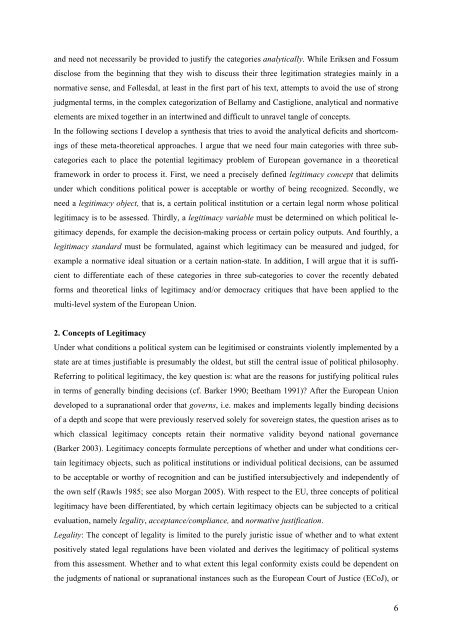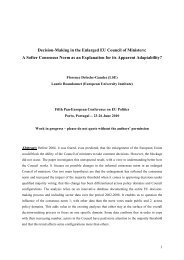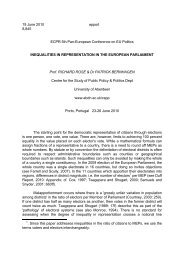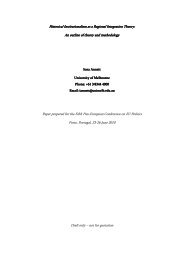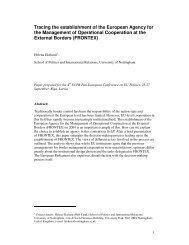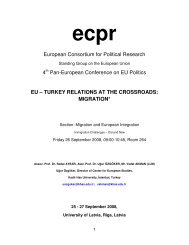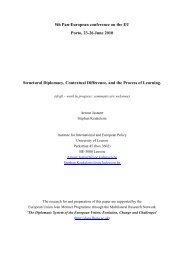Theorising the Democratic Legitimacy of European Governance
Theorising the Democratic Legitimacy of European Governance
Theorising the Democratic Legitimacy of European Governance
Create successful ePaper yourself
Turn your PDF publications into a flip-book with our unique Google optimized e-Paper software.
and need not necessarily be provided to justify <strong>the</strong> categories analytically. While Eriksen and Fossum<br />
disclose from <strong>the</strong> beginning that <strong>the</strong>y wish to discuss <strong>the</strong>ir three legitimation strategies mainly in a<br />
normative sense, and Føllesdal, at least in <strong>the</strong> first part <strong>of</strong> his text, attempts to avoid <strong>the</strong> use <strong>of</strong> strong<br />
judgmental terms, in <strong>the</strong> complex categorization <strong>of</strong> Bellamy and Castiglione, analytical and normative<br />
elements are mixed toge<strong>the</strong>r in an intertwined and difficult to unravel tangle <strong>of</strong> concepts.<br />
In <strong>the</strong> following sections I develop a syn<strong>the</strong>sis that tries to avoid <strong>the</strong> analytical deficits and shortcomings<br />
<strong>of</strong> <strong>the</strong>se meta-<strong>the</strong>oretical approaches. I argue that we need four main categories with three subcategories<br />
each to place <strong>the</strong> potential legitimacy problem <strong>of</strong> <strong>European</strong> governance in a <strong>the</strong>oretical<br />
framework in order to process it. First, we need a precisely defined legitimacy concept that delimits<br />
under which conditions political power is acceptable or worthy <strong>of</strong> being recognized. Secondly, we<br />
need a legitimacy object, that is, a certain political institution or a certain legal norm whose political<br />
legitimacy is to be assessed. Thirdly, a legitimacy variable must be determined on which political legitimacy<br />
depends, for example <strong>the</strong> decision-making process or certain policy outputs. And fourthly, a<br />
legitimacy standard must be formulated, against which legitimacy can be measured and judged, for<br />
example a normative ideal situation or a certain nation-state. In addition, I will argue that it is sufficient<br />
to differentiate each <strong>of</strong> <strong>the</strong>se categories in three sub-categories to cover <strong>the</strong> recently debated<br />
forms and <strong>the</strong>oretical links <strong>of</strong> legitimacy and/or democracy critiques that have been applied to <strong>the</strong><br />
multi-level system <strong>of</strong> <strong>the</strong> <strong>European</strong> Union.<br />
2. Concepts <strong>of</strong> <strong>Legitimacy</strong><br />
Under what conditions a political system can be legitimised or constraints violently implemented by a<br />
state are at times justifiable is presumably <strong>the</strong> oldest, but still <strong>the</strong> central issue <strong>of</strong> political philosophy.<br />
Referring to political legitimacy, <strong>the</strong> key question is: what are <strong>the</strong> reasons for justifying political rules<br />
in terms <strong>of</strong> generally binding decisions (cf. Barker 1990; Beetham 1991)? After <strong>the</strong> <strong>European</strong> Union<br />
developed to a supranational order that governs, i.e. makes and implements legally binding decisions<br />
<strong>of</strong> a depth and scope that were previously reserved solely for sovereign states, <strong>the</strong> question arises as to<br />
which classical legitimacy concepts retain <strong>the</strong>ir normative validity beyond national governance<br />
(Barker 2003). <strong>Legitimacy</strong> concepts formulate perceptions <strong>of</strong> whe<strong>the</strong>r and under what conditions certain<br />
legitimacy objects, such as political institutions or individual political decisions, can be assumed<br />
to be acceptable or worthy <strong>of</strong> recognition and can be justified intersubjectively and independently <strong>of</strong><br />
<strong>the</strong> own self (Rawls 1985; see also Morgan 2005). With respect to <strong>the</strong> EU, three concepts <strong>of</strong> political<br />
legitimacy have been differentiated, by which certain legitimacy objects can be subjected to a critical<br />
evaluation, namely legality, acceptance/compliance, and normative justification.<br />
Legality: The concept <strong>of</strong> legality is limited to <strong>the</strong> purely juristic issue <strong>of</strong> whe<strong>the</strong>r and to what extent<br />
positively stated legal regulations have been violated and derives <strong>the</strong> legitimacy <strong>of</strong> political systems<br />
from this assessment. Whe<strong>the</strong>r and to what extent this legal conformity exists could be dependent on<br />
<strong>the</strong> judgments <strong>of</strong> national or supranational instances such as <strong>the</strong> <strong>European</strong> Court <strong>of</strong> Justice (ECoJ), or<br />
6


